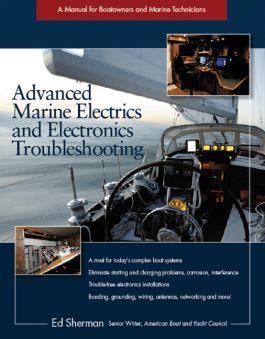Advanced Marine Electrics and Electronics Troubleshooting
Step 1. Download Adobe Digital Editions Both PC and Mac users will need to download Adobe Digital Editions to access their eBook. You can download Adobe Digital Editions at Adobe's website here.
Step 2. Register an Adobe ID if you do not already have one. (This step is optional, but allows you to open the file on multiple devices) Visit account.Adobe.com to register your Adobe account.
Step 3: Authorize Adobe Digital Editions using your Adobe ID. In Adobe Digital Editions, go to the Help menu. Choose “Authorize Computer.”
Step 4: Open your file with Adobe Digital Editions. Once you’ve linked your Adobe Digital Editions with your Adobe ID, you should be able to access your eBook on any device which supports Adobe Digital Editions and is authorized with your ID. If your eBook does not open in Adobe Digital Editions upon download, please contact customer service
Foreword by Tim Murphy, Executive Editor, Cruising World
Preface
Acknowledgments
1. Marine Troubleshooting the Modern Way
Finding Your Way
Electrics versus Electronics
Basic Troubleshooting Steps
Part 1: Electrical Systems Troubleshooting
2. Testing Batteries, Charging Systems, and Starter Circuits, and Measuring Voltage Drop
Catalysts for Change
Conductance Battery Tester
Diagnostic Meter
Value and Utility
3. Testing Continuity and Tracing Circuits
Tone-Generating Circuit Tracer
Alphanumeric Time Domain Reflectometer
Value and Utility
4. Testing AC and Grounding Systems for Polarity, Voltage Drop, Impedance, and Frequency
The SureTest Circuit Analyzer
Value and Utility
5. Temperature Monitoring as a Diagnostic Aid
Infrared Heat-Sensing Gun
Other Uses for Temperature Monitoring
Value and Utility
6. Using Power Factor to Determine Energy Efficiency
Understanding Power Factor
Improving Your Power Factor
Determining Power Consumption
Using a Power Analyzer
Value and Utility
7. Analyzing Harmonic Distortion
Do You Need a Scope?
AC Loads
Harmonic Distortion
Value and Utility
8. Using a Laptop for Intermittent Problems
Laptop Link-Ups
Real-World Examples
9. Testing for Electromagnetic and Radio Frequency Interference
Understanding Electromagnetic Interference
Standards and Regulations
Common Sources and Victims of Interference
Tools of the Trade
10. Testing for Residual Current and Isolating Its Sources
AC Leakage from Appliances
Using a Clamp-On AC Leak Tester
AC Leakage from Degraded Insulation
Using a Megohmmeter
Value and Utility
11. A Basic Corrosion Survey
Tools of the Trade
Underwater Metal Corrosion and Protection Basics
Conducting a Corrosion Survey
12. Grounding Systems
Lightning Protection
Grounding to Minimize RFI Effects
Comparing ABYC and NMEA Grounding Standards
Troubleshooting Redux
Part 2: Marine Electronics Installation and Troubleshooting
13. Electronic Equipment Installation Guidelines
Ergonomics
Watertight Integrity
Thermal Limits
Power Supply
Guidelines Summary
14. Installing Communications and Position-Finding Systems and Radar
Communications Systems
Position-Finding Systems
Radar
15. Installing Depth Sounders, Weather Systems, and Autopilots
Depth Sounders
Wind- and Weather-Monitoring Instruments
Autopilots
16. Coaxial Cable and Antennas
Coaxial Cable Basics
Choosing Coax for Marine Applications
Installing Coaxial Cable
VHF Antennas
SSB Antennas
Satellite Television and Radio Antennas
Cell Phone Antennas
Radar Antennas
17. Onboard Networks
Network Types
NMEA 2000
Troubleshooting
The Future of Onboard Power Distribution
Closing Thoughts
Appendix A: Metric Equivalents
Appendix B: Resources
Appendix C: ABYC Standards of Interest to Marine Electricians and Boatowners
Glossary
List of Acronyms
Index
SAVE TIME AND MONEY WITH THIS STATE-OF-THE-ART GUIDE TO THE LATEST, MOST ADVANCED DIAGNOSTIC EQUIPMENT AND TECHNIQUES
“Ed Sherman is one of America’s great teachers and communicators of marine technology.”--Tim Murphy, Executive Editor, Cruising World
Whether you are a marine electronics professional or a boatowner, Advanced Marine Electrics and Electronics Troubleshooting helps you understand the new, more powerful methods of troubleshooting marine electrical and electronic systems. A modern boat’s sophisticated installations and networked electronics can stretch the traditional diagnostic methods based on trouble lights and multimeters past their useful limits. This book will show you how to:
- Use microprocessor-based diagnostic tools and techniques from the automotive and communications sectors, adapted for boats for the first time
- Diagnose the most difficult AC and DC problems
- Protect communications and navigation electronics from interference and lightning
- Seek out and eliminate stray-current sources and galvanic corrosion

